英语口语交际表达用语PPT课件
合集下载
小学英语口语交际精品PPT课件
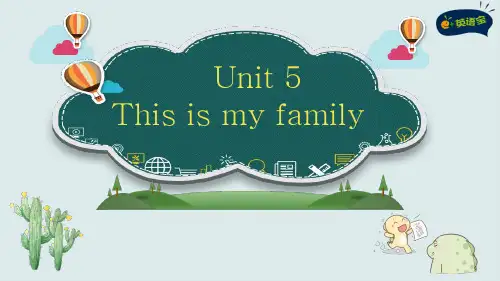
我们所经历的工作、圈子的人际交往或多或少会带给人一些疑问。
我的意见和想法是否能被ta接受? ta对于我的idea又是一种怎样的想法? 如果彼此都不满意,我们求同存异这样真的会好吗?
这种存在差异性的想法,换个角度稍加思索一番,就可以发现: 其实,人与人之间的沟通和理解几乎是不可能的。
任何尝试都可能是徒劳的,甚至很有可能因为说的太多,考虑的太过于全面而伤害到对方。 所以,最明智的做法就是与同事/合作伙伴保持距离,即使我们是主动领导者,也不要靠的太近,更不要动辄强加于人自己的观念。
在《通往财富自由之路》中,笑来先生有一段对财富的精彩描述:人类真正认识市场的好处不过两三百年,而真正研究经济的运作规律迄今也不过300年,而人类对投资理财的探索,只不过200多年才开始的,对于概率和复利这样认知和应用也不到100年左右。根本称不上经验丰富。
谢谢欣 赏 很多人还在使用老祖先遗留下来的模型,什么都要及时获取。那些通过赌博想要一夜暴富的人,那些把买彩票当成改变自己命运的人,那些刚起步就想一蹶而就的人,那些一直寻找武功秘籍、一旦习得、功力大涨、想要天下无敌的人。 人们太想一瞬间以弱变强,以一个成功者的形象出现在人们面前,灼灼生辉,光芒四射,受万人敬仰。
一个短暂快乐的周末小假期,给予我的时光让我充分认识到: 我不会再装模作样地拥有很多朋友,而是要回到了真实独立的自我之中,以真正的我开始了独自的生活。 虽然有时我也会因为寂寞而难以忍受空虚的折磨,但我宁愿以这样的方式来维护自己的自尊,也不愿以耻辱为代价去换取那种表面的朋友。
正所谓,真正的生命不是你活了多少日子,而是你记住了多少日子。
抵达民宿时,太阳已落下了帷幕,温馨点点的灯光在落寞的黑夜中显得无比温暖。
热情周到的女主人迎接我的到来,放下随身物品后,我在小镇上随意寻觅了些小食,就来到了后院安静坐下。
我的意见和想法是否能被ta接受? ta对于我的idea又是一种怎样的想法? 如果彼此都不满意,我们求同存异这样真的会好吗?
这种存在差异性的想法,换个角度稍加思索一番,就可以发现: 其实,人与人之间的沟通和理解几乎是不可能的。
任何尝试都可能是徒劳的,甚至很有可能因为说的太多,考虑的太过于全面而伤害到对方。 所以,最明智的做法就是与同事/合作伙伴保持距离,即使我们是主动领导者,也不要靠的太近,更不要动辄强加于人自己的观念。
在《通往财富自由之路》中,笑来先生有一段对财富的精彩描述:人类真正认识市场的好处不过两三百年,而真正研究经济的运作规律迄今也不过300年,而人类对投资理财的探索,只不过200多年才开始的,对于概率和复利这样认知和应用也不到100年左右。根本称不上经验丰富。
谢谢欣 赏 很多人还在使用老祖先遗留下来的模型,什么都要及时获取。那些通过赌博想要一夜暴富的人,那些把买彩票当成改变自己命运的人,那些刚起步就想一蹶而就的人,那些一直寻找武功秘籍、一旦习得、功力大涨、想要天下无敌的人。 人们太想一瞬间以弱变强,以一个成功者的形象出现在人们面前,灼灼生辉,光芒四射,受万人敬仰。
一个短暂快乐的周末小假期,给予我的时光让我充分认识到: 我不会再装模作样地拥有很多朋友,而是要回到了真实独立的自我之中,以真正的我开始了独自的生活。 虽然有时我也会因为寂寞而难以忍受空虚的折磨,但我宁愿以这样的方式来维护自己的自尊,也不愿以耻辱为代价去换取那种表面的朋友。
正所谓,真正的生命不是你活了多少日子,而是你记住了多少日子。
抵达民宿时,太阳已落下了帷幕,温馨点点的灯光在落寞的黑夜中显得无比温暖。
热情周到的女主人迎接我的到来,放下随身物品后,我在小镇上随意寻觅了些小食,就来到了后院安静坐下。
初中英语日常交际用语PPT课件
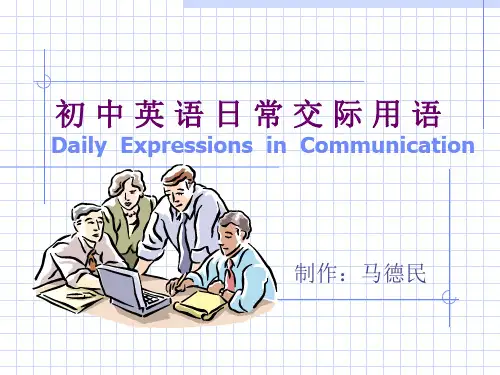
crossing / turning. Take the third turning on the right. It’s about …metres from here.
15.时间、日期和回答 Time, dates and responses
1) What’s the time? / What time is it? It’s 5 o’clock / half past six (six thirty) / a quarter to /past ….
3) Hold on, please. / One moment, please. 4) He / She isn’t here at the moment.
He / She is not here right now. 5) Can I take a message for you? 6) I called to tell you that.
VIII.惊讶惊奇 (Surprise) Really? Oh, dear! Is that so?
IX. 喜好与厌恶 (Likes and dislikes) I like / love (to do)… (very much). I hate / don’t like (to do)….
16.其它方面
I. 意愿 (intentions) I’m going to do…. / I will do …. I’d like to do…. / I want / hope to do….
II. 遗憾和同情 (regrets and sympathy) It’s / What a pity! (I’m) sorry to hear it / that.
a. What’s the weather like today? How’s the weather in…?
15.时间、日期和回答 Time, dates and responses
1) What’s the time? / What time is it? It’s 5 o’clock / half past six (six thirty) / a quarter to /past ….
3) Hold on, please. / One moment, please. 4) He / She isn’t here at the moment.
He / She is not here right now. 5) Can I take a message for you? 6) I called to tell you that.
VIII.惊讶惊奇 (Surprise) Really? Oh, dear! Is that so?
IX. 喜好与厌恶 (Likes and dislikes) I like / love (to do)… (very much). I hate / don’t like (to do)….
16.其它方面
I. 意愿 (intentions) I’m going to do…. / I will do …. I’d like to do…. / I want / hope to do….
II. 遗憾和同情 (regrets and sympathy) It’s / What a pity! (I’m) sorry to hear it / that.
a. What’s the weather like today? How’s the weather in…?
英语口语课ppt课件小学
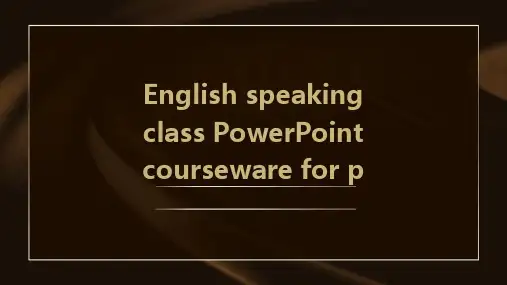
Practical exercises
Group exercises
Group discussion
Divide students into small groups and provide a topic for discussion Encourage them to express their opinions and exchange ideas with each other in English This helps improve their communication skills and understanding of different perspectives
Foster students' interest in English language learning
Prepare students for future English speaking environments and challenges
Course content
01
02
Basic greetings and introductions
Requesting and Providing Assistance
Requesting Assistance
This section of the courseware teachers students how to properly ask for help in English It covers ways to ask for help with various tasks, such as finding a loss item or asking for directions The courseware also teachers students how to respond appropriately when someone asks for their assistance
Group exercises
Group discussion
Divide students into small groups and provide a topic for discussion Encourage them to express their opinions and exchange ideas with each other in English This helps improve their communication skills and understanding of different perspectives
Foster students' interest in English language learning
Prepare students for future English speaking environments and challenges
Course content
01
02
Basic greetings and introductions
Requesting and Providing Assistance
Requesting Assistance
This section of the courseware teachers students how to properly ask for help in English It covers ways to ask for help with various tasks, such as finding a loss item or asking for directions The courseware also teachers students how to respond appropriately when someone asks for their assistance
新人教版三年级上册英语情景对话复习课件ppt
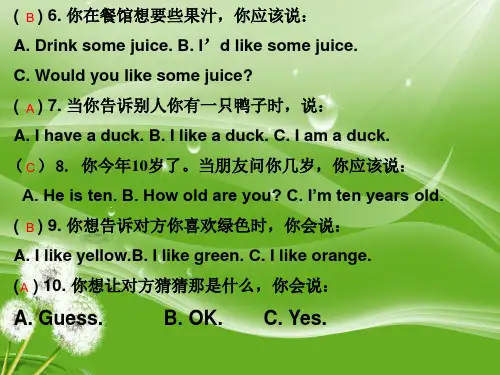
( B) 11. 你想喝点水,你会说:
A. Can I have some milk? B. Can I have some water? C. Can I
have some rice? ( B ) 12. 你想让对方吃这个蛋糕时,你会对他说: A. That one, please.B. Eat some cake, please.C. Eat some
AC. Here you are
( ) 15. 今天是丽丽的生日,同桌会对她说:
为深入学习习近平新时代中国特色社 会主义 思想和 党的十 九大精 神,贯彻 全国教 育大会 精神,充 分发挥 中小学 图书室 育人功 能
( C ) 16. 你和爸爸一起去公园散步,你们遇见了你的班主任孙老 师,你会向爸爸介绍孙老师说: A. Hello, Mr Sun. B. Bye, Mr Sun. C. This is Mr Sun.. ( B) 17. 下午好。 A. Good morning. B. Good afternoon C. Goodbye. ( B) 18. 这是李小姐。 A. That is Miss Li. B. This is Miss Li. C. It’s Miss Li. ( A ) 19. 切蛋糕。 A. Cut the cake. B. Drink some water. C. Eat some fish. ( C ) 20. 不用谢。 A. Thank you. B. I like it. C. You’re welcome.
coAke. ( ) 13. 一位老奶奶摔倒了,你将她扶起来,她会对你说:
BA. Thank you. B. Nice to meet you. C. You’re welcome. ( ) 14. 你刚刚跑完步回来,你很渴,你会对妈妈说:
A. Can I have some milk? B. Can I have some water? C. Can I
have some rice? ( B ) 12. 你想让对方吃这个蛋糕时,你会对他说: A. That one, please.B. Eat some cake, please.C. Eat some
AC. Here you are
( ) 15. 今天是丽丽的生日,同桌会对她说:
为深入学习习近平新时代中国特色社 会主义 思想和 党的十 九大精 神,贯彻 全国教 育大会 精神,充 分发挥 中小学 图书室 育人功 能
( C ) 16. 你和爸爸一起去公园散步,你们遇见了你的班主任孙老 师,你会向爸爸介绍孙老师说: A. Hello, Mr Sun. B. Bye, Mr Sun. C. This is Mr Sun.. ( B) 17. 下午好。 A. Good morning. B. Good afternoon C. Goodbye. ( B) 18. 这是李小姐。 A. That is Miss Li. B. This is Miss Li. C. It’s Miss Li. ( A ) 19. 切蛋糕。 A. Cut the cake. B. Drink some water. C. Eat some fish. ( C ) 20. 不用谢。 A. Thank you. B. I like it. C. You’re welcome.
coAke. ( ) 13. 一位老奶奶摔倒了,你将她扶起来,她会对你说:
BA. Thank you. B. Nice to meet you. C. You’re welcome. ( ) 14. 你刚刚跑完步回来,你很渴,你会对妈妈说:
小学英语日常口语交际教学精品PPT课件 图文
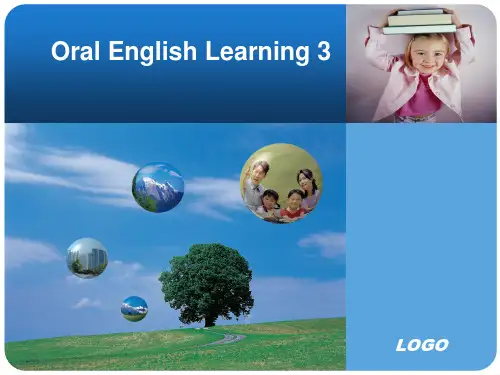
Let’s have a daily talk! 3.邀请
Let’s have a daily talk!
1. It’s time to get up/go to school… 到了起床/去学校 的时候了 2. It’s time for dinner./ English class. 到了(做)…的时候了。 3. Would you like some cakes? Yes, I’d like. / No, thanks
Click to edit company slogan .
LOGO
那夜子都想,自打他俩分手以来,他 看着若 总觉得 隔着、 不透亮 ,像在 雾里, 掩着纱 帘…… 是由于 他不适 应新角 色、心 理有问 题,还 是她的 确有事 儿瞒了 他…… 他画着 问号, 一时又 理不出 头绪… … 第二天上午,也就是周五上午,子都 给亦冰 打电话 问若的 情况, 亦冰说 昨晚他 走后若 就没再 醒过来 ,早晨 他离家 的时候 她还在 床上躺 着;说她 应该是 不去上 班了, 是他给 雨馨准 备的早 饭、送 的学校 ……子 都想一 定是若 的酒劲 还没缓 过来。 他不想 打扰她 休息, 想下午 与她联 系。 下午子都给若打电话,那时她正在去 单位的 路上, 子都说 都三点 了,问 她这么 晚还去 单位干 吗,她 说单位 有事儿; 他又约 她吃晚 饭、或 是找个 地方坐 会儿; 她说晚 上约了 人…… 子都心 里很是 不爽, 嘴上又 不便说 什么, 就说她 身体不 好,办 完事儿 早点回 家,到 家后告 诉他一 声;她应 承着 …… 那晚子都在家心不在焉地看着电视, 总觉着 要发生 点什么 事儿… …“她这 叫归家 吗?今 天这事 儿、明 天那事 儿,以 前也没 说这么 忙过;还 说身体 不好, 好人又 怎样? 谁经得 起天天 这般折 腾…… 唉!碍着 我啥事 儿了, 跟着瞎 起哄, 爱咋咋 吧…… ”他说 是不挂 念,心 里别扭 着。九 点过半 ,仍无 若的消 息,他 心神不 宁……“ 又喝了 ?不要 命了?昨 晚的事 情过眼 就忘… …可怜 的亦冰 ,这些 年真够 难为他 的…… ”他待 要给若 发信息 ,问她 是不是 还在外 面,她 给他发 来信息 ,说她 到家了 ,要他 放心… …他悬 着的心 算是告 一段落 地放下 来,也 该洗洗 睡了… … 子都刚躺下,有电话打进来,是杨巍 的,他 吃了一 惊,第 一反应 就是若 ……这 还是杨 巍初次 用手机 给他打 电话, 他的手 机号码 也是上 次找他 办事儿 时存下 的。“ 若是不 是还在 外面没 回家?出 什么事 儿了… …”他 刚待接 听,那 边挂了 ,等了 几分钟 ,对方 没再打 过来… …“诶? 怎么回 事儿?这 么晚了 ,误碰 ……不 对…… 不管怎 样,打 过去问 问。” 于是他 就把电 话打过 去,电 话通着 ,没人 接听, 他心犯 狐疑, 一连又 打了七 、八个 过去… …“莫 非他与 若在一 起…… 绝不是 误碰… …”他随 即给若 打电话 ,没人 接,再 打……“ 她俩一 定在一 起…… 发生了 什么? 不行, 得去找 她……” 他毫无 迟疑, 起身穿 上衣服 ……“ 今晚一 定要见 着她… …”一种 不安袭 击着他 。他想 给亦冰 打电话 ,问若 在不在 家,又 一想先 别大惊 小怪的 ,过去 看看若 的车是 否在家 再做道 理。他 匆匆离 家,走 的时候 连屋里 的灯也 没顾得 关…… 路上车少,子都心似弹飞,往日的路 程此刻 只用了 一半的 时间。 他留心 过往车 辆,生 怕路上 与她错 过。在 距若的 家不足 一分钟 里程时 ,他发 现前面 路边上 停着一 辆白色 的小车 ,尾灯 闪亮着 ……“车 上一定 有人… …”他 心里一 惊,因 为杨巍 家就在 这儿附 近。“ 莫非若 的车… …”车速 太快, 他急点 刹车, 错车的 一刹凝 眸望去 ,正是 若的车 ,前排 影影绰 绰的两 个人影 ,他脑 袋嗡地 一声, 竟至于 狠踩了 一脚油 门,那 车轰的 一声穿 窜出去 多远… …待他 回过神 来,赶 忙把车 停靠在 路边, 深呼吸 ……
小升初英语口语话题ppt课件
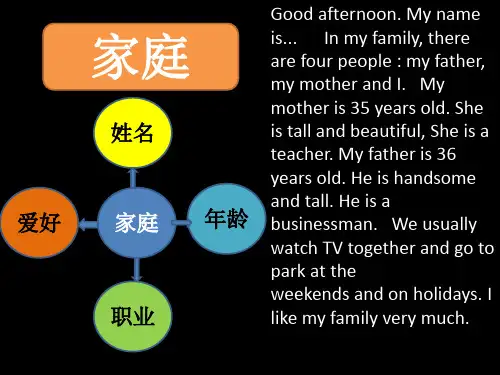
•
你最喜欢的季节是什么?
• My favorite season is summer. It’s hot in summer. I think many children like this season, because they can eat ice-cream and go swimming. I can go swimming ,too. Sometimes I go too the beach with my parents. Sometimes I go to the swimming pool with my friends. I usually visit many places in summer vacation.
•
用英语介绍一下你的父亲。
• My father is 40 years old. He is tall and strong. He likes playing sports very much. He often plays basketball with me on weekends. He is a teacher. He teaches English. He loves his students very much.
你最喜欢的节日是什么?
• My favorite festival is the Spring Festival. In the Spring Festival, I can play with my friends. I can eat a lot of delicious food. I can get some lucky money. We have a special meal. It’s a big family dinner. I love Spring Festival.
你最喜欢的季节是什么?
• My favorite season is summer. It’s hot in summer. I think many children like this season, because they can eat ice-cream and go swimming. I can go swimming ,too. Sometimes I go too the beach with my parents. Sometimes I go to the swimming pool with my friends. I usually visit many places in summer vacation.
•
用英语介绍一下你的父亲。
• My father is 40 years old. He is tall and strong. He likes playing sports very much. He often plays basketball with me on weekends. He is a teacher. He teaches English. He loves his students very much.
你最喜欢的节日是什么?
• My favorite festival is the Spring Festival. In the Spring Festival, I can play with my friends. I can eat a lot of delicious food. I can get some lucky money. We have a special meal. It’s a big family dinner. I love Spring Festival.
英语情景口语课件ppt
At the hospital
• Detailed description
• Registration: Learners should know how to register, such as "I need to register as a patient, please.". • Consultation: During a doctor's consultation, learners should learn to describe their condition, such as "I have
Ticket purchase: Learners should learn how to purchase tickets, such as "I would like to book a roundtrip ticket from New York to Los Angeles, please.".
Check in: When checking in, learners should understand how to register their check-in information, such as "My name is John Smith and I reserved a room for three nights.".
Withdrawal: Learners should learn how to withdraw from an account, such as "I would like to withdraw $200 from my checking account.".
Deposit: Learners should know how to deposit cash into their account, such as "I would like to deposit these checks into my account.".
英语口语训练:常用英语口语PPT课件
• Incorporating interactive activities: The course incorporates various interactive activities to encourage students' active participation and enhance their learning experience.
learning method
• Using PPT courseware: This course adopts PowerPoint presentations as the main teaching material, providing visual and auditory support for students' learning.
Enhancing language comprehension
The course aims to improve students' ability to understand English-speaking materials and media.
Developing communication skills
used in the afternoon, usually after noon.
03
04
Good evening
used in the evening, usually after sunset.
Hello
a general greeting, can be used at any time of the day.
learning method
• Using PPT courseware: This course adopts PowerPoint presentations as the main teaching material, providing visual and auditory support for students' learning.
learning method
• Using PPT courseware: This course adopts PowerPoint presentations as the main teaching material, providing visual and auditory support for students' learning.
Enhancing language comprehension
The course aims to improve students' ability to understand English-speaking materials and media.
Developing communication skills
used in the afternoon, usually after noon.
03
04
Good evening
used in the evening, usually after sunset.
Hello
a general greeting, can be used at any time of the day.
learning method
• Using PPT courseware: This course adopts PowerPoint presentations as the main teaching material, providing visual and auditory support for students' learning.
英语口语课PPT课件
第7页/共23页
• Hello,Jim. • Hi,Jarr y. • Long time no see. • Yes, long time no see. I miss you. • I miss you, too. • Nice to meet you. • Nice to meet you,too.
Hello.
What’s your
Hi, Lucy. I’m Rebecca. Hi, Rebecca.
Nice to meet you.
Nice to meet you, too.
(Long time no see.
I miss you.)
第15页/共23页
第17页/共23页
问路的表达。
第18页/共23页
Let's sing and dance.
让我们边唱边跳吧。
第19页/共23页
left left right right go turn around go go go left right left left right right left left right right go go go left left right right go turn around go go go
第1页/共23页
早上好,女士们、先生们 Good morning,
ladies and
gentlemen.
第2页/共23页
好久不见.
第3页/共23页
第4页/共23页
第5页/共23页
Conversations 情景对话
第6页/共23页
• 你好,Jim. • 你好,Jarr y. • 好久不见。 • 是啊,好久不见。我很想你。 • 我也很想你。 • 见到你很开心。 • 见到你也很开心。
• Hello,Jim. • Hi,Jarr y. • Long time no see. • Yes, long time no see. I miss you. • I miss you, too. • Nice to meet you. • Nice to meet you,too.
Hello.
What’s your
Hi, Lucy. I’m Rebecca. Hi, Rebecca.
Nice to meet you.
Nice to meet you, too.
(Long time no see.
I miss you.)
第15页/共23页
第17页/共23页
问路的表达。
第18页/共23页
Let's sing and dance.
让我们边唱边跳吧。
第19页/共23页
left left right right go turn around go go go left right left left right right left left right right go go go left left right right go turn around go go go
第1页/共23页
早上好,女士们、先生们 Good morning,
ladies and
gentlemen.
第2页/共23页
好久不见.
第3页/共23页
第4页/共23页
第5页/共23页
Conversations 情景对话
第6页/共23页
• 你好,Jim. • 你好,Jarr y. • 好久不见。 • 是啊,好久不见。我很想你。 • 我也很想你。 • 见到你很开心。 • 见到你也很开心。
英语交际用语课件ppt
01
Leisure and entertainment language
Understand common vocabulary and expressions related to movies.
In the movie theater scene, learners can learn English expressions related to how to buy tickets, choose seats, discuss movie plot, and so on. In addition, you can also learn some vocabulary related to the cinema environment, such as popcorn, beverages, screens, etc.
Service etiquette
It is important to be a family with basic service etiquette, such as saying "please" and "thank you," and leaving a tip
Table setting and handling
Summary and Closing
Summarize the key points of the meeting, thank you for participating, and announce the end of the meeting.
Establish good relationships: Use friendly language to establish trust and a good communication atmosphere before negotiations begin.
- 1、下载文档前请自行甄别文档内容的完整性,平台不提供额外的编辑、内容补充、找答案等附加服务。
- 2、"仅部分预览"的文档,不可在线预览部分如存在完整性等问题,可反馈申请退款(可完整预览的文档不适用该条件!)。
- 3、如文档侵犯您的权益,请联系客服反馈,我们会尽快为您处理(人工客服工作时间:9:00-18:30)。
(ages) ! How’s everything going?
• 2)Oh, hello, Wang. I’m so glad to see you. How’re
you doing?
• 3)Hi, John! Nice to meet you here. How are you
getting on? (How are things with you?)
Friendship Delegation? • 3)Mr. Johnson, allow me to introduce you to Mr. Wang.
Jack, I'd like you to meet my Chinese friend, Wang.
6
• (3)Exchange of formalities
• 2)How’s Bob?
•
How’s the family?
•
How’s everybody at the office?
2
• (2)Expressing surprise and pleasure in seeing
someone
• 1)Hello, Jack. Haven’t seen you for a long time
•
—Good-bye.
• 2)I’m afraid I’ve got to be going now. So long!
•
—So long!
• 4 )I’m afraid I must be going now. It was nice meeting you. See you later.
•
—(I’m) glad to have met you, too. Take care.
•
—It was nice to have you, Mr. …. Good night.
4
• (2)When taking one’s leave
• 1)I hope you’ve enjoyed your stay in China.
•
—I certainly have. I shall never forget my visit
8
• (2)Giving answers
• 1)Don’t mention it.
• 2)Not at all.
• 3)You’re welcome.
• 4)Sure thing.
• 5)I’m very glad to have been of help to you.
• 1)How do you do?
• —How do you do?
• 2)(I’m) glad to meet you.
• —(I’m) glad to meet you, too.
• 3)(I’m) delighted to know you, Mr. Smith.
• —(I’m) equally delighted to meet you.
• 4)Hi, Mary! Fancy running into you here! It’s
great to see you again. What have you been doing
since I saw you last?
3
2.分手时对话
• (1)Announcing that you must be leaving • 1)Well, I must be off. Good-bye.
• 5)Sorry, I’ll have to be going. It’s getting very late. Good night.
•
—Good night.
• 6)Mr. Smith. Thank you for a pleasant evening. I must be going now. See you tomorrow.
• 4 )(I’m) very pleased to meet you.
• —The pleasure is mine.
• 5)(It’s) nice to meet you.
• —Same here.
7
4.感谢与回答
• (1)Thank you (very much) • 1)Thanks (a lot) . • 2)It’s very kind (thoughtful) of you ! • 3)How kind (thoughtful) of you! • 4)(I’m very) much obliged (to you) . • 5)I’m really very grateful to you. • 6)I shall always feel indebted to you. • 7)Thank you anyway (all the same) .
口语交际 ---表达用语
1
1.见面时对话
• (1)Greetings
• 1)How are you?
•
—Fine, (Very well, Not bad,) thank you. And
you?
•
—Just so so. I have a headache.
•
—Not too well, I’m afraid.
to your wonderful country.
• 2)Thank you for everything you’ve done for me during my stay here.
•
—You’re welcome.
• 3)I wish you a pleasaБайду номын сангаасt journey.
•
—Thank you.
5
3.相互介绍时对话
• (1)Introducing yourself • 1)May I introduce myself ? I’m …. • 2)How do you do? My name is …. • 3)Mr. Jones, I believe? My name is …. • 4)Hi, My name is… • (2)Introducing somebody else • 1)Mr. Smith, this is Mr. Wang. • 2)May I introduce you to Mr. Wang, head of the
